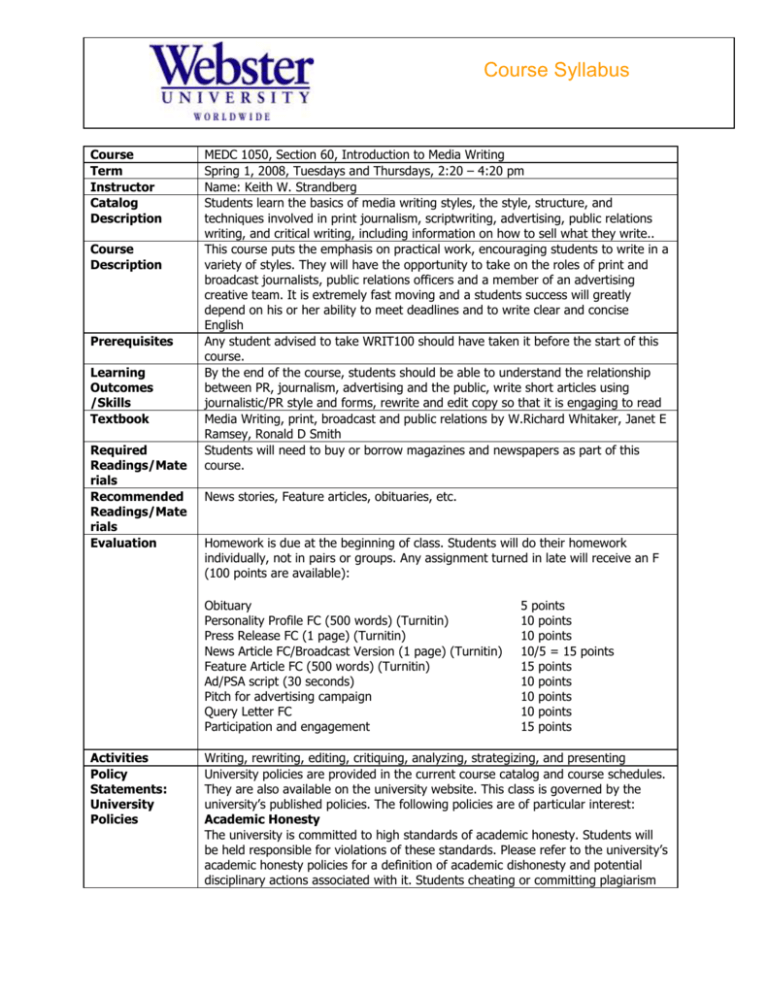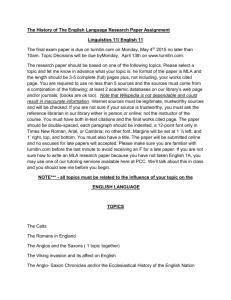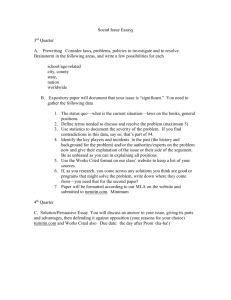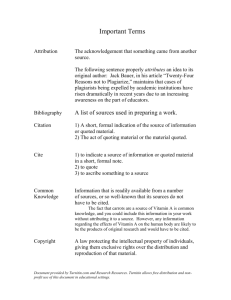
Course Syllabus
Course
Term
Instructor
Catalog
Description
Course
Description
Prerequisites
Learning
Outcomes
/Skills
Textbook
Required
Readings/Mate
rials
Recommended
Readings/Mate
rials
Evaluation
MEDC 1050, Section 60, Introduction to Media Writing
Spring 1, 2008, Tuesdays and Thursdays, 2:20 – 4:20 pm
Name: Keith W. Strandberg
Students learn the basics of media writing styles, the style, structure, and
techniques involved in print journalism, scriptwriting, advertising, public relations
writing, and critical writing, including information on how to sell what they write..
This course puts the emphasis on practical work, encouraging students to write in a
variety of styles. They will have the opportunity to take on the roles of print and
broadcast journalists, public relations officers and a member of an advertising
creative team. It is extremely fast moving and a students success will greatly
depend on his or her ability to meet deadlines and to write clear and concise
English
Any student advised to take WRIT100 should have taken it before the start of this
course.
By the end of the course, students should be able to understand the relationship
between PR, journalism, advertising and the public, write short articles using
journalistic/PR style and forms, rewrite and edit copy so that it is engaging to read
Media Writing, print, broadcast and public relations by W.Richard Whitaker, Janet E
Ramsey, Ronald D Smith
Students will need to buy or borrow magazines and newspapers as part of this
course.
News stories, Feature articles, obituaries, etc.
Homework is due at the beginning of class. Students will do their homework
individually, not in pairs or groups. Any assignment turned in late will receive an F
(100 points are available):
Obituary
Personality Profile FC (500 words) (Turnitin)
Press Release FC (1 page) (Turnitin)
News Article FC/Broadcast Version (1 page) (Turnitin)
Feature Article FC (500 words) (Turnitin)
Ad/PSA script (30 seconds)
Pitch for advertising campaign
Query Letter FC
Participation and engagement
Activities
Policy
Statements:
University
Policies
5 points
10 points
10 points
10/5 = 15 points
15 points
10 points
10 points
10 points
15 points
Writing, rewriting, editing, critiquing, analyzing, strategizing, and presenting
University policies are provided in the current course catalog and course schedules.
They are also available on the university website. This class is governed by the
university’s published policies. The following policies are of particular interest:
Academic Honesty
The university is committed to high standards of academic honesty. Students will
be held responsible for violations of these standards. Please refer to the university’s
academic honesty policies for a definition of academic dishonesty and potential
disciplinary actions associated with it. Students cheating or committing plagiarism
will be awarded a failing grade for the course, and may be subject to dismissal
and/or further disciplinary measures.
Course Policies
Weekly
Schedule
Additional
Information
Students are expected to attend class regularly, be on time and to prepare for
each class by completing the readings and assignments.
Class dates and topics, including chapters to read and
assignments due (any assignment turned in after the due date will
receive an F)
Jan. 13: Media Writing Overview – who are you writing for?
Jan. 15: Different Writing Styles
read chapters 4
Jan. 20: Comparing Styles
Compare two same category magazines and two same category
newspapers,
class presentation
Jan. 22: Interviewing
Read chapter 6
Jan. 27: News Writing
Read Chapters 5 and 7, Personality Profile due (Turnitin)
(copies for all)
Jan. 29: Obits, Rewriting
Read Chapter 8
Feb. 3: Features
Read Chapter 9, News Story Due (Turnitin) (copies for all)
Feb. 5: Writing workshop
Feb. 10: Broadcast Writing
Read Chapters 10 and 11, Obituary Due (copies for all)
Feb. 12: Broadcast News Writing
Feature story review (copies for all)
Feb. 17: TV Radio and Campaign – Writing the PSA/AD
Feature story due (Turnitin) (copies for all)
Feb. 19: Pitches for PSA/AD
Broadcast version of News Story Due (Turnitin) (copies for all)
Feb. 24: Writing Workshop
Feb. 26: Press Release Writing
Read Chapters 12, 13 and 14, PSA/Ad due (Turnitin) (copies for
all)
March 3: Market Research, Idea Generation, Query Letters
March 5: Round Up
Query Letter due
PLAGIARISM
Students who are discovered cheating or committing plagiarism will be
awarded a failing grade for the course, and may be subject to dismissal or
further discipline.
Reviewed and approved by ______________, Webster University Geneva,
Switzerland.
Copyright © 2005 – 2006, Webster University. All rights reserved



